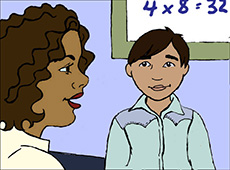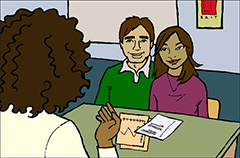What resources should Ms. Milton consult to learn more about Evan’s and Emily’s needs?
Page 3: The Student and the Family
Getting Student Input

It is imperative to talk with students with visual disabilities to gather the necessary information to assist in their successful inclusion and active participation within the classroom and in other school activities. Many students who have visual impairments, especially older ones, will often know what their needs are. For example, they may be able to tell the teacher where they need to be seated to:
- Navigate best within the classroom
- View the chalkboard or other presentations
- Access assistive technology
The students may also be able to tell the teacher about:
- Subject areas that present challenges
- Their preferred medium(s) for instructional materials (e.g., braille, large print)
- Their ability to find items in the classroom
- Proper use of assistive devices or technology
- Difficulties in other areas of the school (e.g., cafeteria, bathroom, other classrooms)
| Sample Questions to Ask the Student with a Visual Impairment | |
| What are your favorite school subjects and activities? | |
| What subjects do you feel you need to work on most? | |
| Is there anything you think I should know to help you learn better? | |
| How are you feeling about your ability to find what you need (e.g., desk, books, materials) in this classroom? | |
| Are you having any difficulties with any of the assistive devices or technology you are using? | |
| Do you feel comfortable letting me know when you need help? | |
| Who are your friends at school? | |
| Are you having any difficulties in the cafeteria (e.g., getting your food, finding a seat with students with whom you enjoy eating)? | |
| Are you enjoying recess or after-school activities? What activities do you do? Are you aware of other activities you might do at recess or after school (e.g., clubs, sports, games)? Do you know how to get involved in these activities? | |
| What activities do you like to do at home? | |
| Are there any questions that you would like to ask? | |
Adapted from British Columbia’s Ministry of Education, Special Education Branch
(www.bced.gov.bc.ca/specialed/visimpair/)
Remember, the students are a valuable resource and should always be consulted since they may provide information that professionals and caregivers would not have considered.
Getting the Family’s Perspective
 Meeting the needs of students with visual disabilities is much more successful with assistance and input from the family. Family members can provide:
Meeting the needs of students with visual disabilities is much more successful with assistance and input from the family. Family members can provide:
- Facts related to the child’s vision loss and level of independence at home and in the community
- Information about the use of specialized equipment
- Suggestions for working with the child, including strategies and learning needs
- Goals for the child that they would like you to address
| Sample Questions to Ask Family Members | |
| Tell me about your child’s vision loss. | |
| How independent is your child at home? At school? In the community? | |
| What particular difficulties do I need to be aware of? How much assistance do you feel I need to provide at this time? | |
| What reports or other information about your child do you feel are important for me to have? | |
| Is your child seeing other specialists or professionals that I should be aware of? | |
| Is your child using any special equipment at home? Does he or she know how to maintain it? What is done when it isn’t working? | |
| Can you recommend any strategies that would help me work effectively with your child? | |
| There will likely be some questions about your child’s vision loss from other students. Do you have suggestions about what might be said and how it should be presented to the class? | |
| What educational goals do you have for your child? | |
| What social goals do you have for your child? | |
| Are there any questions that you would like to ask me? | |
Adapted from British Columbia’s Ministry of Education, Special Education Branch
(www.bced.gov.bc.ca/specialed/visimpair/)
The information they provide may assist in establishing a foundation of knowledge for working with the student who is blind or has low vision.